- Home
- Bobby Akart
Yellowstone: Survival: A Post-Apocalyptic Survival Thriller (The Yellowstone Series Book 4)
Yellowstone: Survival: A Post-Apocalyptic Survival Thriller (The Yellowstone Series Book 4) Read online
Thank you for downloading YELLOWSTONE: SURVIVAL, the final installment in The Yellowstone Series, by Author Bobby Akart.
For free copies of two of my novels, updates on new releases, special offers, and bonus content
Click Here to Sign Up
or visit my Amazon Marquee page at
Amazon.com/BobbyAkart
or visit me online at
BobbyAkart.com
Other Works by Amazon Top 100 Author, Bobby Akart
The Doomsday Series
Apocalypse
Haven
The Yellowstone Series
Hellfire
Inferno
Fallout
Survival
The Lone Star Series
Axis of Evil
Beyond Borders
Lines in the Sand
Texas Strong
Fifth Column
Suicide Six
The Pandemic Series
Beginnings
The Innocents
Level 6
Quietus
The Blackout Series
36 Hours
Zero Hour
Turning Point
Shiloh Ranch
Hornet’s Nest
Devil’s Homecoming
The Boston Brahmin Series
The Loyal Nine
Cyber Attack
Martial Law
False Flag
The Mechanics
Choose Freedom
Patriot’s Farewell
Seeds of Liberty (Companion Guide)
The Prepping for Tomorrow Series
Cyber Warfare
EMP: Electromagnetic Pulse
Economic Collapse
Yellowstone: Survival
The Yellowstone Series, Book Four
by
Bobby Akart
Contents
Dedications
Acknowledgements
About the Author, Bobby Akart
Author’s Introduction to the Yellowstone Series
Epigraph
PART ONE
Chapter 1
Chapter 2
Chapter 3
Chapter 4
Chapter 5
Chapter 6
Chapter 7
Chapter 8
Chapter 9
Chapter 10
Chapter 11
Chapter 12
Chapter 13
Chapter 14
PART TWO
Chapter 15
Chapter 16
Chapter 17
Chapter 18
Chapter 19
Chapter 20
Chapter 21
Chapter 22
Chapter 23
Chapter 24
PART THREE
Chapter 25
Chapter 26
Chapter 27
Chapter 28
Chapter 29
Chapter 30
Chapter 31
Chapter 32
Chapter 33
Chapter 34
Chapter 35
Chapter 36
Chapter 37
Chapter 38
Chapter 39
Chapter 40
Chapter 41
Chapter 42
PART FOUR
Chapter 43
Chapter 44
Chapter 45
Chapter 46
Chapter 47
Chapter 48
Chapter 49
Chapter 50
Chapter 51
Chapter 52
Chapter 53
Chapter 54
Bonus Excerpt from DOOMSDAY: Apocalypse
Copyright Information
Dedications
To my darling Dani and the girls.
There is nothing more precious to me than the time I get to spend with you. I love our life together.
To a courageous young lass in the United Kingdom named Ella.
Your life is just beginning, with a disadvantage, to be sure. I hope one day you can read the story of the fictional Ella in this novel and realize no matter how difficult life may seem at times, you can overcome it because you are blessed with the power to persevere. Our love is with you as you tackle life, and we have no doubt you’ll accomplish great things!
To Dusty Holder, In Memoriam.
You took a young, pudgy boy under your wing and turned him into a golfer who came within one bad shot of qualifying for the U.S. Open at age sixteen. More importantly, you taught me that life is full of mishits, and only a true failure wallers in his anger or sorrow. I heard many times—get your head on straight and keep playing. I’ve lived my life accordingly. I’ve been up and down more times than I can count. But I always keep playing. Thank you, old friend.
To Wild Bill Cherry, In Memoriam.
Professor Bill Cherry taught geography and geology at the University of Tennessee, Knoxville, when I was an undergraduate there. Known for his unusual approach in lecturing, he earned the nickname Wild Bill. Readers of the Blackout series might recall a character by that name. Anyway, Wild Bill Cherry taught me to love science and rocks. He also taught me that the landscape around us didn’t happen through the assistance of unicorns and rainbows. Most of our planet’s appearance came about as a result of violent conflicts underground, which changed the surface above. Wild Bill, I’ll never forget sharing a Budweiser with you at The Last Lap on the Strip. This one’s for you, Professor.
Acknowledgements
Writing a book that is both informative and entertaining requires a tremendous team effort. Writing is the easy part. For their efforts in making Yellowstone: Fallout, book three in the Yellowstone series, a reality, I would like to thank Hristo Argirov Kovatliev for his incredible cover art, Pauline Nolet for her editorial prowess, Stef Mcdaid for making this manuscript decipherable in so many formats, Chris Abernathy for his memorable performance in narrating this novel, and the Team—Denise, Joe, Jim, Shirley, and Kelly—whose advice, friendship and attention to detail is priceless.
For the Yellowstone series, I had to make use of a wealth of source material and studied the research of every form of scientist imaginable in my attempt to get it right. There are so many to thank, so let me get started, in no particular order.
University of Utah, Professor Emeritus Bob Smith, the world’s leading expert on the geophysics of Yellowstone National Park. Professor Smith’s research at Yellowstone began in 1956. He has conducted pioneering geophysics investigations of the Yellowstone hotspot that have become a model for evaluations of volcanic hazards worldwide. My single biggest takeaway from Professor Smith is this: When the earthquakes stop, that is the time to start worrying. Earthquakes relieve pressure. Without them, the planet would burst. If you’d like to learn more about his perspective on Earth’s creative forces, purchase his book, Windows into the Earth, on Amazon.
Dr. Brian H. Wilcox, an aerospace engineer at the Jet Propulsion Laboratory in Pasadena, California, co-authored a research paper titled Defending Human Civilization Supervolcanic Eruptions. Wilcox boldly raised the proposition that the greatest threat to humankind may not come from above, in the form of a near-Earth object, but rather, from below, as an eruption from the Yellowstone supervolcano. Dr. Wilcox made headlines in 2017 when he posited the idea of pumping water into Yellowstone to cool the magma chamber with the ancillary benefit of extracting steam to drive electricity-generating turbines. To his credit, he warned that such an expensive, risky proposition would have to be undertaken with care and done
correctly.
Dr. Michael R. Rampino, Professor of Biology at NYU, conducts research in the area of earth sciences and in the causes of mass extinctions in particular. He has focused ongoing research on large supervolcanic explosive events that result in catastrophic climate change. The episodes of volcanic winters in our history may have caused the near extinction of humans. Dr. Rampino believes a reoccurrence would most likely threaten our civilization and existence. For more on Dr. Rampino’s work, purchase Cataclysms, A New Geology for the Twenty-First Century, available on Amazon.
Finally, to my new friends at GeoScienceWorld in McLean, Virginia, who helped guide me during my initial research into the subjects of earthquakes, volcanoes, and anything else going on under our feet. You folks are way smarter than I am!
Thank you all!
About the Author, Bobby Akart
Author Bobby Akart has been ranked by Amazon as #55 in its Top 100 list of most popular, bestselling authors. He achieved #2 bestselling Horror Author, the #3 bestselling Religion & Spirituality Author, the #2 bestselling Science Fiction Author, the #7 bestselling Historical Author and the #8 bestselling Action & Adventure Author.
He has written over twenty international bestsellers, in forty-plus fiction and nonfiction genres, including the reader-favorite Lone Star series, the critically acclaimed Boston Brahmin series, the bestselling Blackout series, the frighteningly realistic Pandemic Series, his highly cited nonfiction Prepping for Tomorrow series and his latest project—the Yellowstone series, hailed by scientists as frighteningly realistic.
His novel, Yellowstone: Fallout reached #50 on the Amazon bestsellers list and earned him two Kindle All-Star awards for most pages read in a month, and most pages read as an author.
Bobby has provided his readers a diverse range of topics that are both informative and entertaining. His attention to detail and impeccable research have allowed him to capture the imaginations of his readers through his fictional works and bring them valuable knowledge through his nonfiction books.
SIGN UP for Bobby Akart’s mailing list to receive special offers, bonus content, and you’ll be the first to receive news about new releases in the Doomsday series.
VISIT Amazon.com/BobbyAkart, a dedicated feature page created by Amazon for his work, to view more information on his thriller fiction novels and post-apocalyptic book series, as well as his nonfiction Prepping for Tomorrow series. Visit Bobby Akart’s website for informative blog entries on preparedness, writing, and a behind-the-scenes look into his novels.
BobbyAkart.com
Author’s Introduction to the Yellowstone Series
June 15, 2018
Anniversary of the Mount Pinatubo eruption
Let me get right to the point. While most people look at volcanic eruptions as natural disasters, the fact of the matter is, without them, the Earth would explode.
When I began outlining the Yellowstone series earlier this year, I came across numerous articles about telltale signs of Yellowstone’s imminent eruption. Many of them came from online news websites in the United Kingdom. Sometimes, alternative news sites in the United States would republish their content.
As I furthered my research, I noticed that news reports of this nature dated back for many, many years. In other words, Chicken Little was at it again—The sky is falling! The sky is falling!
Too often, we become desensitized to the threats we face because the media, desperate to draw attention to their publications, in whatever format, overstate the signs of collapse.
Rather than focus on the news, I delved into the science. I’ve come to accept that volcanic activity is absolutely necessary for our planet’s survival but is also one of the biggest threats to mankind’s survival.
Volcanoes are the Earth’s way of letting off steam. Deep beneath the surface of the planet, excess heat builds up, and it finds a way to vent. Over many thousands of years, intense energy is created by the heat from the Earth’s core. Natural radioactivity in the granite beneath the surface couples with leftover energy from the time our planet was created some four and a half billion years ago, to generate an unimaginable pressure.
Imagine an extremely overcrowded city bus in the dead heat of summer, stalled in traffic, with no air-conditioning. The anger built up by the passengers reaches a boiling point until they force their way into the street, spilling out of the bus. Like an overcrowded bus, the overheated magma under our Earth’s surface stews in its own madness, allowing pent-up frustrations to boil over, until it releases its fury—its hellfire—upon the world above.
The energy released by volcanoes varies in degree depending upon the type. To put it in perspective, consider this. Throughout 2017, the International Energy Agency estimated that the entire world used eighteen terawatts of energy. By comparison, the amount of built-up energy seeking to escape the Earth’s interior is almost fifty terawatts—nearly triple.
This graphic provides a basic look at what lies beneath us.
However, those who live near active volcanoes have something lurking below that most of us do not—magma. People who lived in Leilani Estates, Hawaii, and near Volcán de Fuego in Guatemala spent their days playing golf or walking to their villages. But beneath their feet, slowly, relentlessly, subterranean rivers of magma, the molten rock that constantly forces itself toward the surface, bullied their way through the mantle and crust. When it broke the surface, the eruptions in these two regions of the world faced devastating consequences.
Here’s a graphic of the Kilauea volcanic activity.
While Volcán de Fuego, a conical stratovolcano, blasted an ash cloud that crushed surrounding villages, Kilauea was a perfect example of a slow eruption, featuring multiple fissures and vents oozing magma down its gentle slopes. To the casual observer, Kilauea appeared nonthreatening in terms of explosivity. Pictures began to surface of the aforementioned golfer, folks roasting marshmallows over the magma, and others taking selfies near the glowing flame.
With the attention given Kilauea, it’s hard for many to fathom some of the more devastating volcanic eruptions, such as Mount St. Helens in 1980 and Mount Pinatubo in 1991. Mount St. Helens registered as a VEI 5 on the Volcanic Explosivity Index. Mount Pinatubo was a VEI 6.
Using Mount Pinatubo as an example, which is located in the Philippines, the eruption ejected ten trillion tons of magma into the stratosphere. Another twenty million tons of sulfur dioxide combined with toxic metals and minerals to fill the air around the planet. For many months, a layer of sulfuric acid haze circled the globe. During a three-year period, global temperatures dropped half a degree, and the Earth’s ozone layer was depleted temporarily.
Which brings us to our chart setting forth the relative levels of volcanic eruptions. Many factors go into determining the VEI, including the volume emitted during the eruption and the cloud height. Currently, the Kilauea eruption is scaled in the VEI 1 to VEI 2 range. The Volcán de Fuego eruption in Guatemala will approach a VEI 3.
The largest volcanic eruptions in history, known as mega-colossal, have reached a category of VEI 8. The smallest of the Yellowstone Caldera eruptions occurred six hundred thousand years ago and has been estimated to be a VEI 8. Scientific evidence shows an eruption of this magnitude to occur on our planet every fifty thousand years. The last VEI 8 supervolcanic eruption on a level similar to Yellowstone was on Sumatra in Indonesia.
The Toba super eruption, which occurred seventy-five thousand years ago, has long been considered one of the Earth’s largest known eruptions. The Toba catastrophe resulted in a volcanic winter of six to ten years and a period of nearly a thousand years of global cooling.
Genetic research was conducted showing the number of modern humans dropped significantly about the same time the eruption occurred. The Toba Catastrophe Theory posited that people today evolved from the few thousand survivors who managed to avoid the worldwide impact of the eruption.
The giant plume of ash stretched from Southeast Asia all the way to the Middle East. Since
then, other researchers have found evidence that pockets of humanity continued their lives during this period. As a result, they cast doubt on the Toba Catastrophe Theory. The fact remains, however, that in the time period following the eruption of Toba, mankind almost became extinct, and no other plausible theory has been accepted by the scientific community as a whole.
The following graph depicts the various levels of volcanic eruptions. As you scroll down the graphic, note which volcanic system is associated with the highest level that doesn’t appear on the chart—VEI 8.
Yellowstone’s three prior eruptions have been equal to, or greater than, Toba. Which takes us back to our VEI scale. A Yellowstone eruption will be at least a thousand times more powerful than Mount St. Helens and ten thousand times more powerful than Volcán de Fuego or Kilauea.
When seeing the death and destruction left behind by these smaller, more humbling eruptions, it’s easy to see why the Yellowstone Caldera garners so much attention from scientists. It is easily the most monitored volcanic system in the world.
Yellowstone is quite simply the most potentially explosive, violent, deadly, active volcano on Earth, and scientists agree—a catastrophic eruption is inevitable.
Yellowstone erupted two-point-one million years ago and then again one-point-three million years ago. The last time it erupted was six hundred thirty thousand years ago. Scientists agree that Yellowstone, and our planet, is overdue for a massive, violent eruption. It will be an environmental disaster of global proportions. It might be, in fact, an extinction-level event. If so, it won’t be the first time.
I can’t resist repeating this often-overused phrase—it’s not a matter of if, but when.
Yellowstone is not an ordinary volcano. It is an extraordinary killer that will show itself in due time. Will Yellowstone erupt during our lifetimes? Maybe, or maybe not.

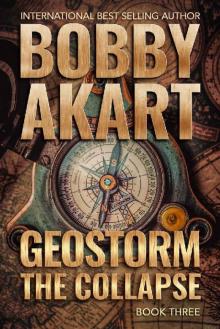 Geostorm The Collapse: A Post Apocalyptic EMP Survival Thriller (The Geostorm Series Book 3)
Geostorm The Collapse: A Post Apocalyptic EMP Survival Thriller (The Geostorm Series Book 3)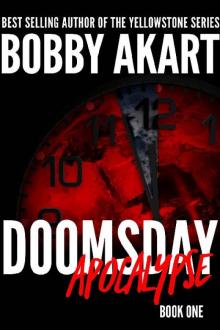 Doomsday Apocalypse
Doomsday Apocalypse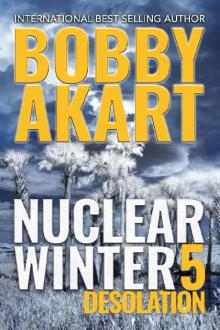 Nuclear Winter Desolation: Post Apocalyptic Survival Thriller (Nuclear Winter Series Book 5)
Nuclear Winter Desolation: Post Apocalyptic Survival Thriller (Nuclear Winter Series Book 5)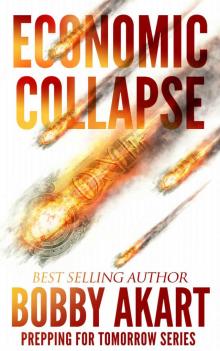 Economic Collapse (Prepping for Tomorrow Book 2)
Economic Collapse (Prepping for Tomorrow Book 2)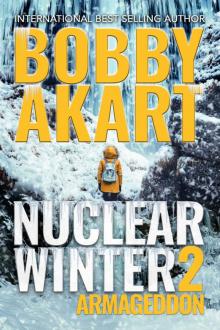 Nuclear Winter Armageddon
Nuclear Winter Armageddon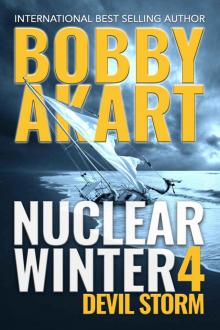 Nuclear Winter Devil Storm
Nuclear Winter Devil Storm Virus Hunters 3: A Medical Thriller
Virus Hunters 3: A Medical Thriller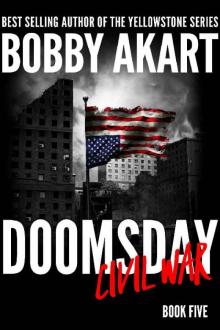 Doomsday Civil War: A Post-Apocalyptic Survival Thriller (The Doomsday Series Book 5)
Doomsday Civil War: A Post-Apocalyptic Survival Thriller (The Doomsday Series Book 5)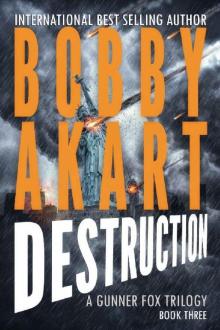 Asteroid Destruction
Asteroid Destruction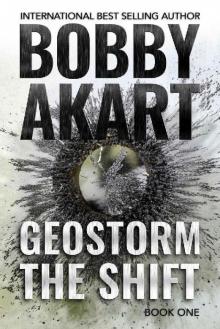 Geostorm the Shift
Geostorm the Shift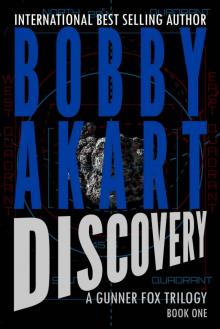 Asteroid Discovery
Asteroid Discovery Virus Hunters 2: A Medical Thriller
Virus Hunters 2: A Medical Thriller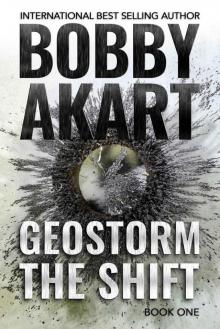 Geostorm The Shift: A Post-Apocalyptic EMP Survival Thriller (The Geostorm Series Book 1)
Geostorm The Shift: A Post-Apocalyptic EMP Survival Thriller (The Geostorm Series Book 1) Asteroid Diversion
Asteroid Diversion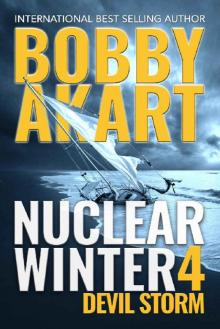 Nuclear Winter Devil Storm: Post Apocalyptic Survival Thriller (Nuclear Winter Series Book 4)
Nuclear Winter Devil Storm: Post Apocalyptic Survival Thriller (Nuclear Winter Series Book 4)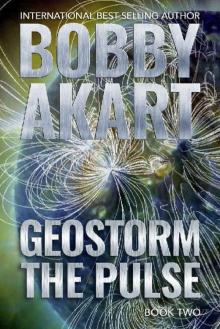 Geostorm The Pulse: A Post Apocalyptic EMP Survival Thriller (The Geostorm Series Book 2)
Geostorm The Pulse: A Post Apocalyptic EMP Survival Thriller (The Geostorm Series Book 2)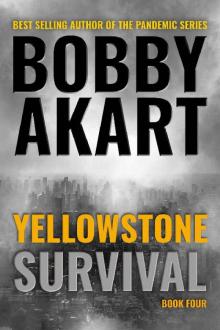 Yellowstone: Survival: A Post-Apocalyptic Survival Thriller (The Yellowstone Series Book 4)
Yellowstone: Survival: A Post-Apocalyptic Survival Thriller (The Yellowstone Series Book 4)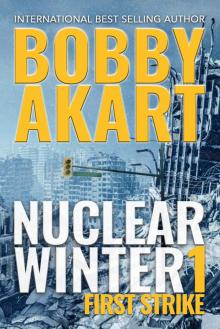 Nuclear Winter First Strike: Post-Apocalyptic Survival Thriller
Nuclear Winter First Strike: Post-Apocalyptic Survival Thriller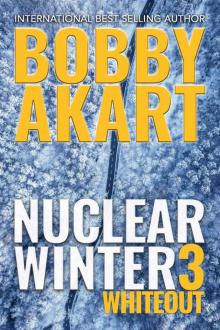 Nuclear Winter Whiteout
Nuclear Winter Whiteout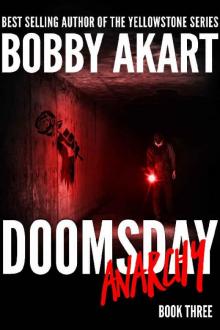 Doomsday Anarchy
Doomsday Anarchy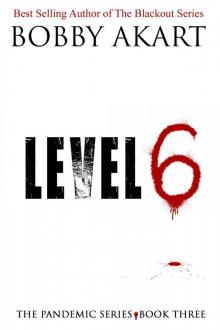 Pandemic: Level 6: A Post Apocalyptic Medical Thriller Fiction Series (The Pandemic Series Book 3)
Pandemic: Level 6: A Post Apocalyptic Medical Thriller Fiction Series (The Pandemic Series Book 3) Martial Law
Martial Law Odessa Reborn: A Terrorism Thriller (Gunner Fox Book 4)
Odessa Reborn: A Terrorism Thriller (Gunner Fox Book 4)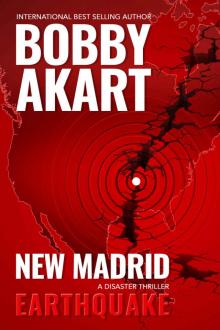 New Madrid Earthquake
New Madrid Earthquake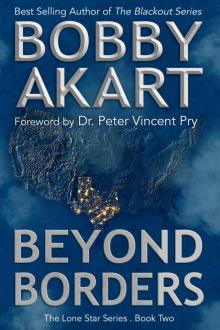 Beyond Borders: Post Apocalyptic EMP Survival Fiction (The Lone Star Series Book 2)
Beyond Borders: Post Apocalyptic EMP Survival Fiction (The Lone Star Series Book 2)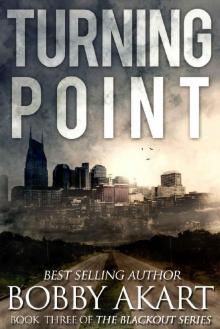 The Blackout Series (Book 3): Turning Point
The Blackout Series (Book 3): Turning Point Patriot's Farewell: A Political Thriller Fiction Series (Boston Brahmin Political Thrillers Book 7)
Patriot's Farewell: A Political Thriller Fiction Series (Boston Brahmin Political Thrillers Book 7)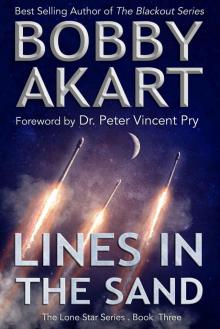 Lines in the Sand_Post Apocalyptic EMP Survival Fiction
Lines in the Sand_Post Apocalyptic EMP Survival Fiction The Mechanics: A Post-Apocalyptic Fiction Series
The Mechanics: A Post-Apocalyptic Fiction Series The Loyal Nine
The Loyal Nine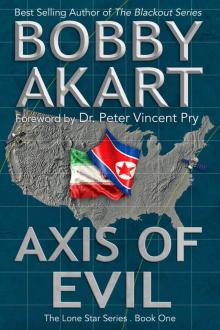 Axis of Evil
Axis of Evil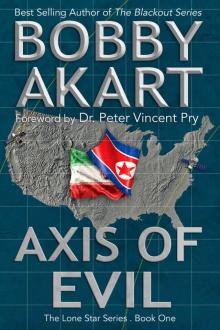 Axis of Evil: Post Apocalyptic EMP Survival Fiction (The Lone Star Series Book 1)
Axis of Evil: Post Apocalyptic EMP Survival Fiction (The Lone Star Series Book 1)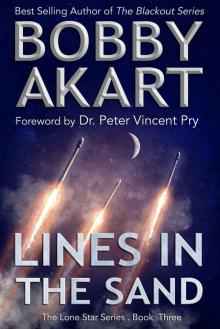 Lines in the Sand: Post Apocalyptic EMP Survival Fiction (The Lone Star Series Book 3)
Lines in the Sand: Post Apocalyptic EMP Survival Fiction (The Lone Star Series Book 3) Odessa Strikes
Odessa Strikes The Blackout Series (Book 4): Shiloh Ranch
The Blackout Series (Book 4): Shiloh Ranch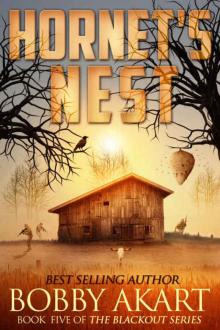 Hornet's Nest: A Post Apocalyptic EMP Survival Fiction Series (The Blackout Series Book 5)
Hornet's Nest: A Post Apocalyptic EMP Survival Fiction Series (The Blackout Series Book 5)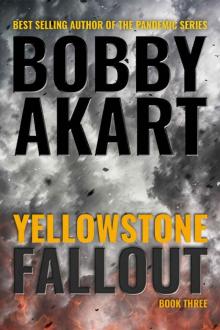 Yellowstone: Fallout: A Post-Apocalyptic Survival Thriller (The Yellowstone Series Book 3)
Yellowstone: Fallout: A Post-Apocalyptic Survival Thriller (The Yellowstone Series Book 3)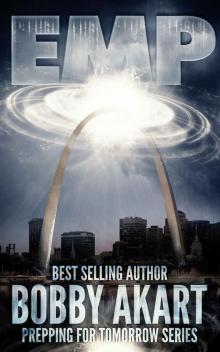 Electromagnetic Pulse
Electromagnetic Pulse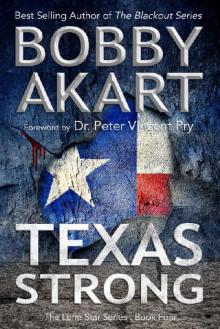 Texas Strong: Post Apocalyptic EMP Survival Fiction (The Lone Star Series Book 4)
Texas Strong: Post Apocalyptic EMP Survival Fiction (The Lone Star Series Book 4)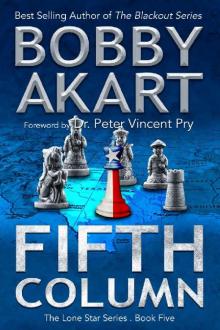 Fifth Column_Post Apocalyptic EMP Survival Fiction
Fifth Column_Post Apocalyptic EMP Survival Fiction Patriot's Farewell
Patriot's Farewell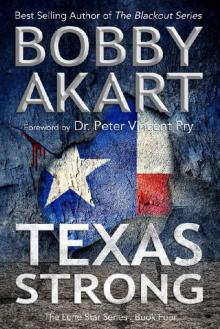 Texas Strong_Post Apocalyptic EMP Survival Fiction
Texas Strong_Post Apocalyptic EMP Survival Fiction Pandemic: The Innocents: A Post-Apocalyptic Medical Thriller Fiction Series (The Pandemic Series Book 2)
Pandemic: The Innocents: A Post-Apocalyptic Medical Thriller Fiction Series (The Pandemic Series Book 2) Shiloh Ranch: A Post Apocalyptic EMP Survival Fiction Series (The Blackout Series Book 4)
Shiloh Ranch: A Post Apocalyptic EMP Survival Fiction Series (The Blackout Series Book 4) Cyber Attack
Cyber Attack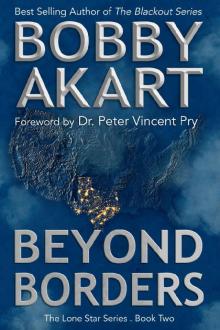 Beyond Borders
Beyond Borders Choose Freedom: A Post-Apocalyptic Fiction Series (The Boston Brahmin Book 6)
Choose Freedom: A Post-Apocalyptic Fiction Series (The Boston Brahmin Book 6) False Flag
False Flag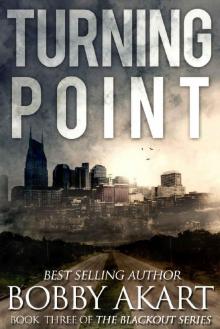 Turning Point: A Post Apocalyptic EMP Survival Fiction Series (The Blackout Series Book 3)
Turning Point: A Post Apocalyptic EMP Survival Fiction Series (The Blackout Series Book 3)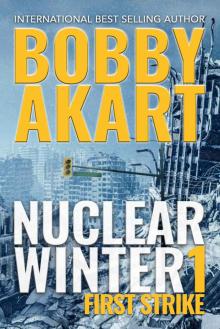 Nuclear Winter First Strike
Nuclear Winter First Strike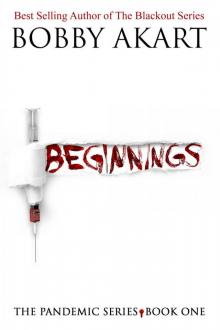 Pandemic: Beginnings: A Post-Apocalyptic Medical Thriller Fiction Series (The Pandemic Series Book 1)
Pandemic: Beginnings: A Post-Apocalyptic Medical Thriller Fiction Series (The Pandemic Series Book 1) Devil's Homecoming: A Post Apocalyptic EMP Survival Fiction Series (The Blackout Series Book 6)
Devil's Homecoming: A Post Apocalyptic EMP Survival Fiction Series (The Blackout Series Book 6) The Blackout Series (Book 6): Devil's Homecoming
The Blackout Series (Book 6): Devil's Homecoming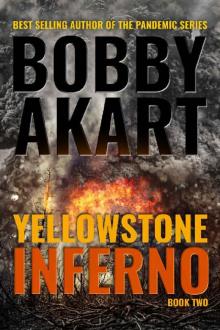 Yellowstone: Inferno: A Post-Apocalyptic Survival Thriller (The Yellowstone Series Book 2)
Yellowstone: Inferno: A Post-Apocalyptic Survival Thriller (The Yellowstone Series Book 2)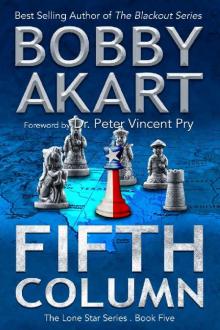 Fifth Column: Post Apocalyptic EMP Survival Fiction (The Lone Star Series Book 5)
Fifth Column: Post Apocalyptic EMP Survival Fiction (The Lone Star Series Book 5)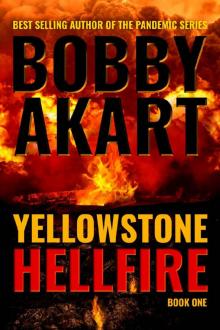 Yellowstone: Hellfire: A Post-Apocalyptic Survival Thriller (The Yellowstone Series Book 1)
Yellowstone: Hellfire: A Post-Apocalyptic Survival Thriller (The Yellowstone Series Book 1)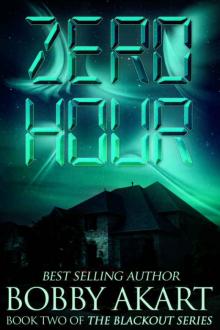 The Blackout Series (Book 2): Zero Hour
The Blackout Series (Book 2): Zero Hour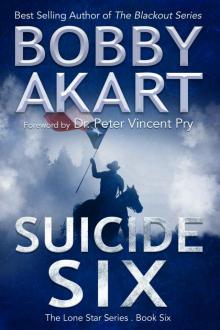 Suicide Six: Post Apocalyptic EMP Survival Fiction (The Lone Star Series Book 6)
Suicide Six: Post Apocalyptic EMP Survival Fiction (The Lone Star Series Book 6)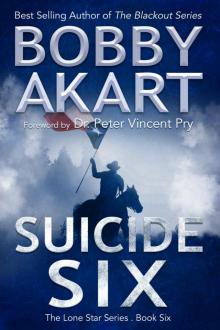 Suicide Six_Post Apocalyptic EMP Survival Fiction
Suicide Six_Post Apocalyptic EMP Survival Fiction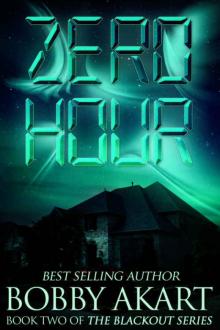 Zero Hour: A Post-Apocalyptic EMP Survival Fiction Series (The Blackout Series Book 2)
Zero Hour: A Post-Apocalyptic EMP Survival Fiction Series (The Blackout Series Book 2)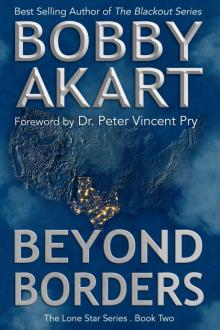 Beyond Borders_Post Apocalyptic EMP Survival Fiction
Beyond Borders_Post Apocalyptic EMP Survival Fiction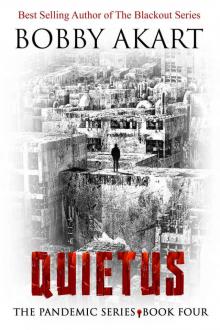 Pandemic: Quietus: A Post-Apocalyptic Dystopian Fiction Series (The Pandemic Series Book 4)
Pandemic: Quietus: A Post-Apocalyptic Dystopian Fiction Series (The Pandemic Series Book 4)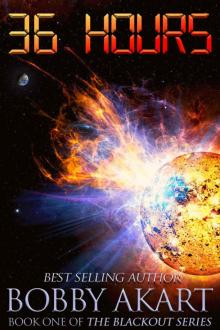 36 Hours: A Post-Apocalyptic EMP Survival Fiction Series
36 Hours: A Post-Apocalyptic EMP Survival Fiction Series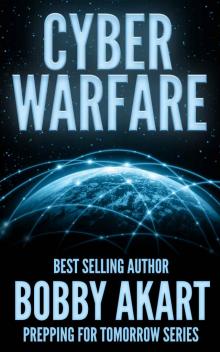 Cyber Warfare
Cyber Warfare